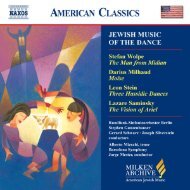Download Liner Notes PDF - Milken Archive of Jewish Music
Download Liner Notes PDF - Milken Archive of Jewish Music
Download Liner Notes PDF - Milken Archive of Jewish Music
Create successful ePaper yourself
Turn your PDF publications into a flip-book with our unique Google optimized e-Paper software.
Fefer, Robeson, and Mikhoels at the Soviet Consulate,<br />
New York City, summer 1943<br />
anti-Semites, pro-Fascists, and isolationist antiwar<br />
factions who might welcome “pro<strong>of</strong>” that the<br />
American war effort in the European theater was<br />
indeed the result <strong>of</strong> <strong>Jewish</strong> and “international Zionist”<br />
instigation on behalf <strong>of</strong> European Jewry.<br />
During the war, when some <strong>of</strong> the Soviet restrictions<br />
against patently <strong>Jewish</strong> literary expressions were<br />
relaxed, at least in part to facilitate <strong>Jewish</strong> cooperation<br />
and support, Fefer wrote his poem “Ikh bin a yid”<br />
(I Am a Jew), which has been described not only in<br />
terms <strong>of</strong> expressing <strong>Jewish</strong> pride, but as a “sample <strong>of</strong><br />
Soviet <strong>Jewish</strong> patriotism.” In his 1946 poem “Epitaph”<br />
he spoke <strong>of</strong> being buried in a <strong>Jewish</strong> cemetery, and he<br />
articulated the hope that he would be remembered<br />
as one who had “served his people.” These works,<br />
together with Di shotns fun varshever geto, appear<br />
to represent an awakening and intensification <strong>of</strong><br />
Fefer’s <strong>Jewish</strong> consciousness. The extent to which they<br />
contributed directly to his persecution and eventual<br />
execution is not entirely clear. It is known, however,<br />
that “Ikh bin a yid” was quoted in 1952, in connection<br />
with the prosecutorial proceedings against the <strong>Jewish</strong><br />
Anti-Fascist Committee, as evidence <strong>of</strong> his “nationalist<br />
deviation.” In any case, by 1948, despite <strong>of</strong>ficial<br />
party line denials <strong>of</strong> anti-Semitism (and its technical<br />
constitutional illegality in the U.S.S.R.), Stalin had<br />
come to fear any thriving Soviet <strong>Jewish</strong> culture as a<br />
serious threat—ranging from mere furtherance or<br />
fertilization <strong>of</strong> the Yiddish language (now deemed far<br />
less necessary to the party in view <strong>of</strong> the vastly reduced<br />
Yiddish readership) to <strong>Jewish</strong> cultural preservation<br />
or solidarity. And those who, like Fefer, had contact<br />
with the West during the war were now suspected <strong>of</strong><br />
being irrevocably tainted potential recruits as enemies<br />
<strong>of</strong> the state. Once the Soviet Union had prevailed in<br />
the war, EAK, now no longer useful to the regime, was<br />
considered a liability as a perceived representative <strong>of</strong><br />
Soviet Jewry. It was disbanded in 1948, and many <strong>of</strong><br />
its leaders were executed. Apart from concealed or<br />
“mysterious” deaths, subsequent kangaroo trials <strong>of</strong><br />
fifteen people linked to EAK resulted in thirteen <strong>of</strong><br />
them being executed by firing squad in 1952.<br />
By the time the State <strong>of</strong> Israel was established in<br />
1948 and recognized by the Soviet Union, Fefer<br />
had embraced the Zionist cause as an appropriate<br />
concern <strong>of</strong> world Jewry; and he even credited Soviet<br />
heroism during the war with contributing to the<br />
ultimate realization <strong>of</strong> Zionist political aspirations.<br />
This could only have magnified the precariousness <strong>of</strong><br />
his situation. As a foreign policy strategy, the U.S.S.R.<br />
supported Israel’s founding as a reduction <strong>of</strong> British<br />
imperial influence and as a potential ally. But within<br />
the U.S.S.R., Zionist sympathy and enthusiasm for<br />
the new state were read more clearly than ever as<br />
dangerous <strong>Jewish</strong> nationalism and potential disloyalty.<br />
Having already lost his benefit to the regime, Fefer’s<br />
combination <strong>of</strong> Yiddishist cultural nationalism and<br />
Zionist sympathy had to have signaled a sense <strong>of</strong><br />
<strong>Jewish</strong> particularity that might only impede the<br />
mandated progress <strong>of</strong> accelerated assimilation.<br />
Fefer was arrested in December 1948 and held at<br />
the infamous Lubyanka Prison. When Paul Robeson,<br />
the famous American black singer, actor, and social<br />
activist, as well as avowed communist and Stalin<br />
15 8.559440<br />
Helfman_<strong>Liner</strong>Nts 9440.indd 15<br />
12/5/05 1:03:55 PM
















